The acronym E-A-T stands for “Expertise, Authoritativeness, and Trustworthiness.”
This term comes from Google’s Quality Rater Guidelines and is now believed to be one of the most important SEO ranking factors.
E-A-T is particularly important for so-called YMYL websites, which stands for “Your Money, Your Life.”
YMYL is another term found in Google’s guidelines and refers to websites that can impact the health, finances, happiness or safety of users. In Google’s eyes, these types of websites require a higher standard of trust.
Sites with good E-A-T will rank higher than sites with poor E-A-T. This is especially true for health websites, many of which have been struggling with Google algorithm updates in the past year or so.
If you want to improve your rankings and get more traffic, then you should pay serious attention to your website’s E-A-T and take steps to improve it.
Unfortunately, there is no way to directly measure E-A-T. But reading Google’s guidelines and using some common sense provides a lot of ideas to improve it.
Here are 10 actionable ways to boost your website’s E-A-T (Expertise, Authoritativeness, and Trustworthiness).
1. Have good bylines
Bylines are the text right below post titles that show the author name, date and more. They are now more important for SEO than ever before.
This makes total sense considering E-A-T because the byline is the best place to quickly demonstrate your expertise and help increase trust for people who land on your site through a search engine.
When people land on a page through a search engine, they make a split-second decision about whether that page looks trustworthy. If the page has a great byline then people are more likely to stick around and consume the content.
Because of this, I recently redesigned the byline on this site to look more trustworthy. Here’s a screenshot:
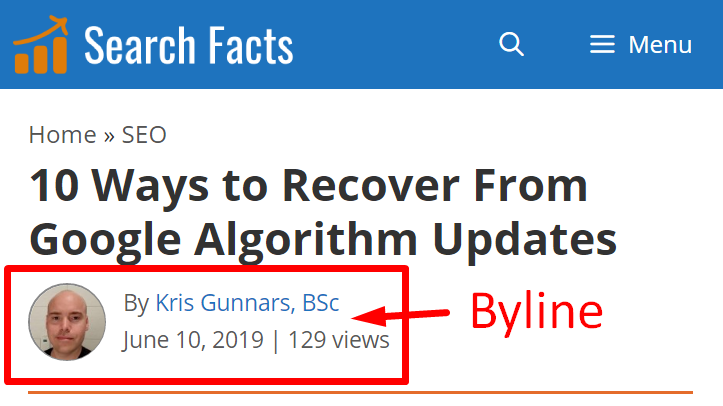
These are some features to include in your byline:
- Author name: The name of the article’s author.
- Date: This should be either the published date or the last updated date (if you use updated date, make sure the article was actually updated!).
- Credentials (optional): This is mostly important for medical sites. If the author has an MD or RD then your readers should know about it.
- Medical reviews (optional): Medical and health sites may also want to include a medical reviewer with credentials, especially if the author lacks credentials.
- Social proof (optional): Sometimes it is appropriate to show an element of social proof in the byline, such as the number of post comments or views.
- Author photo (optional): Showing a photo of the author can make the page look more trustworthy.
It is absolutely crucial for the byline to show right below the title on both desktop and mobile! Many sites hide the byline on mobile or move it to the bottom of the page.
This provides terrible user experience, especially for content where the date or credentials of the author are important.
Here’s an example of a great byline from Healthline, a major medical site that has done incredibly well during E-A-T related Google updates:
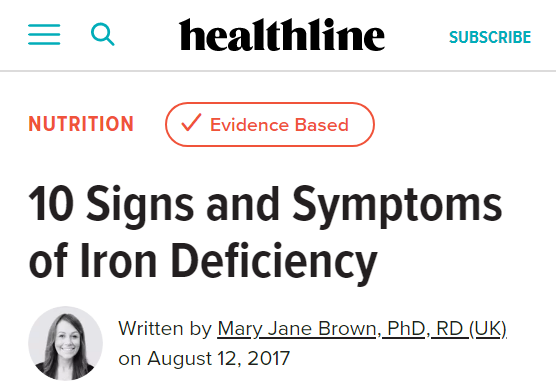
The name of the author should be a clickable link to a page where readers can learn more about the author. This brings us to the next super important parts of displaying E-A-T — author and about pages.
Bottom Line: Having a good byline is one of the most important ways to display expertise and trust on a web page. It is often the first thing that people look at when deciding whether to trust a website or not.
2. Create good author pages
It should be very easy for readers to find more information about a site’s authors.
For websites that have many authors, it may be good to do this by giving each one a unique author page.
The author page needs to clearly show the name of the author, along with a photo and any relevant credentials.
The text on the page should then outline the author’s expertise, experiences, and accomplishments. Explain why the reader should think that this person knows what they are talking about.
If the author has relevant education, has won awards, has done speaking at major conferences, etc, then the author page should highlight all of this.
It can also help increase trust to link to the author’s social media profiles, such as Twitter and LinkedIn profiles. These profiles should also look complete and trustworthy.
For authors that also have their own websites, then it makes sense to link to these websites from the author pages if they are high-quality and relevant.
In some cases, it also helps to have contact details on this page to show readers that they have the option of contacting the author directly.
I recently redesigned my own author page to better highlight my experience in SEO and online marketing:
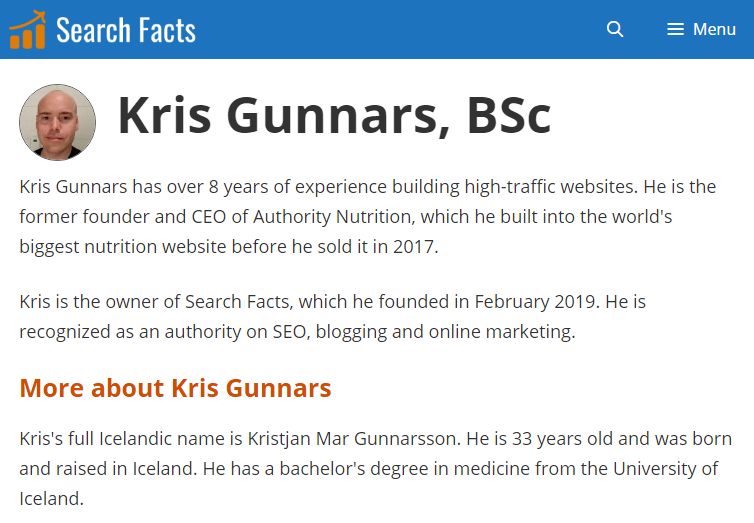
The page also highlights some of my accomplishments, links to my social media profiles and has clear contact information.
Bottom Line: It should be easy for readers to find more information about the authors of articles. Author pages should highlight why the author is an expert and authority.
3. Have a robust about page
Every website should have an about page that is easy to find.
A robust about page is one of the most important ways for a website to establish trust.
This about page should highlight what the website’s purpose is, who created it and who is responsible for the content.
Unless there is a really good reason not to, include the names of the website’s owners or main contributors.
If your site only has one author, yourself, then you can skip the author page altogether and just link to your about page from your byline.
But in that case, make sure that the about page clearly explains why you are an expert and authority on the topic.
Here’s an example of a robust about page from Dr. Marie Haynes, who is a well-known SEO expert and the world’s leading authority on Google’s E-A-T score:
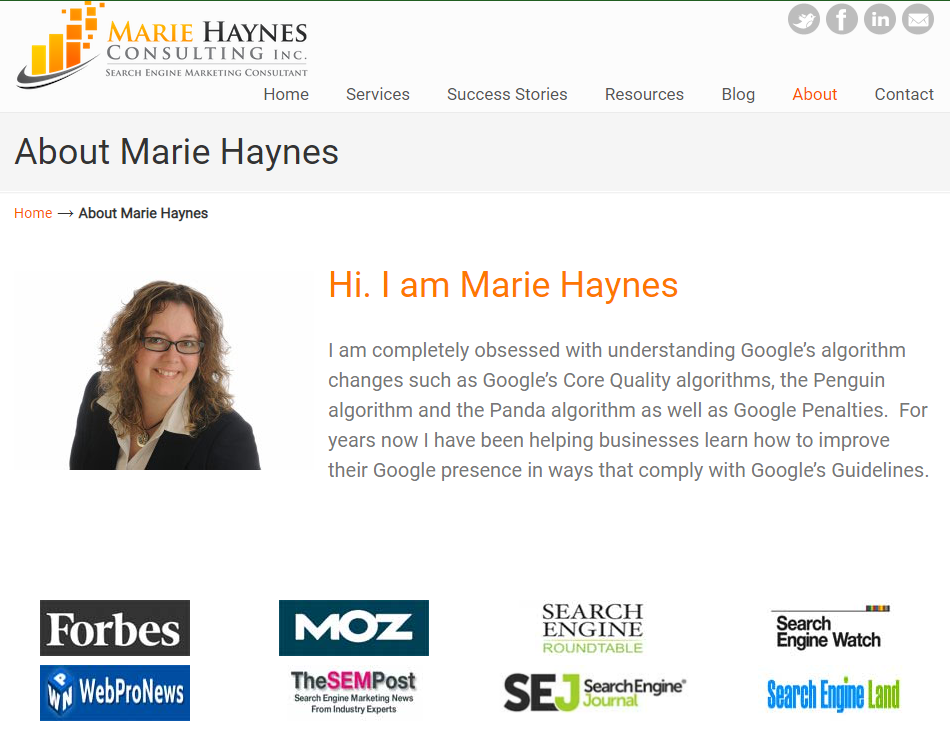
The page has several elements that clearly establish her expertise and authority. For example, she highlights various authoritative publications she has written for.
She also has a customer testimonial and a link to a podcast where she speaks with clear expertise on SEO.
It is impossible not to think she knows what she’s talking about after viewing that page.
This is what you should strive for with your about page in order to boost E-A-T.
Bottom Line: Having a robust about page is one of the most important ways to boost a website’s trust. It should include the website’s purpose and who is responsible for the content.
4. Show clear and accessible contact info
Having contact options is a very important element to establish trust.
This is particularly important for websites that sell products and services. People should be able to contact you easily if they need assistance.
In some cases, it makes sense to highlight this information right at the top of the website, in the header or menu bar.
Contact information can also be important for informational websites. It helps to establish trust if you show that you are receptive to feedback.
It may even look extra trustworthy to list your company’s address and phone number on the contact page. I do this myself and it is very rare that people call me.
Bottom Line: Websites should have clear and accessible contact details, especially companies that sell products and services. Including an address and phone number can also look very trustworthy.
5. Have all the necessary legal pages
You may be required to have certain pages on your site for legal reasons, such as a privacy policy and terms and conditions page.
Whether this also matters for E-A-T is unclear, but it does make sense to include them just in case.
You can find templates online that help you build these pages. If you use WordPress, then there is a template inside that you can use to get started on a privacy policy.
These pages should be easy to access from your footer. Most people don’t look at them, but it is trustworthy to see that they are there.
Here’s another example from the footer of Healthline, a site that has truly mastered the art of displaying E-A-T:
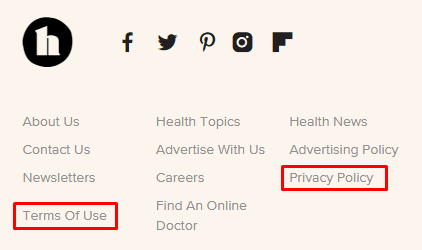
If you sell products or services, then you should also have a page that clearly explains your policy on returns and refunds.
Depending on the size and scale of your website, additional pages could also make sense. This includes disclaimer pages, advertisement policy, media page, press releases, news and others.
Bottom Line: Make sure that your site includes all the necessary legal pages, such as privacy policy and terms and conditions. Return and refund policies are also crucial for sites that sell products and services.
6. Get links from relevant high-authority domains
Backlinks are probably the biggest part of the “A” (authority) in E-A-T.
This means that your site’s authority is largely determined by the quality and quantity of inbound links from relevant high-authority domains.
Some have theorized that the E-A-T of the sites that link to you is important, which makes sense. Chances are that links from sites with high E-A-T are the only ones that can really boost your own E-A-T.
If this is true, then the quality of your inbound links is incredibly important.
Unfortunately, there is no simple “hack” to get truly natural links from truly authoritative sites. If it were easy, then it wouldn’t be such an important ranking factor. To view a healthy backlink profile, type “epwealth.com” into Moz and you’ll see a very well balanced backlink profile:
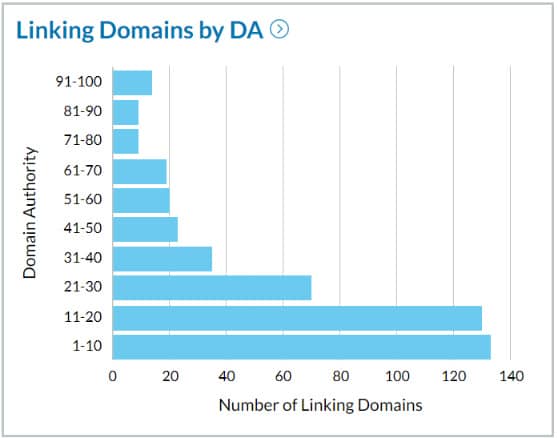
Having exceptionally high-quality content and working on establishing yourself as an authority in your industry is likely to help a lot.
You can learn some good tactics from Brian Dean’s link building guide.
Bottom Line: Getting links from authoritative websites with high E-A-T is likely to boost your rankings. Links are likely the biggest determinant of the “A” (authority) in E-A-T.
7. Have content written or reviewed by credentialed experts
When it comes to certain topics, Google really wants to show content that is written by credentialed experts.
This is particularly important for YMYL (your money, your life) content — as in, content that can affect people’s health, happiness, finances or safety.
For example, it would usually be best for an article about a disease to be written by a medical doctor.
At the same time, an article about legal advice should be written by an attorney or someone with a legal degree.
Although experts can definitely be wrong in many cases, people are more comfortable trusting content that was made by someone with relevant credentials.
It is definitely best to have your content written by an expert, but having it reviewed by a credentialed expert can be a good alternative.
If you have a medical site, you should consider hiring a medical reviewer to review your content and verify its accuracy. Then you can display the medical reviewer’s name in the byline, with a link to their profile.
Here’s an example from Medical News Today, another site that has dominated the search results despite all the algorithm updates in the past year that affected most health sites negatively.
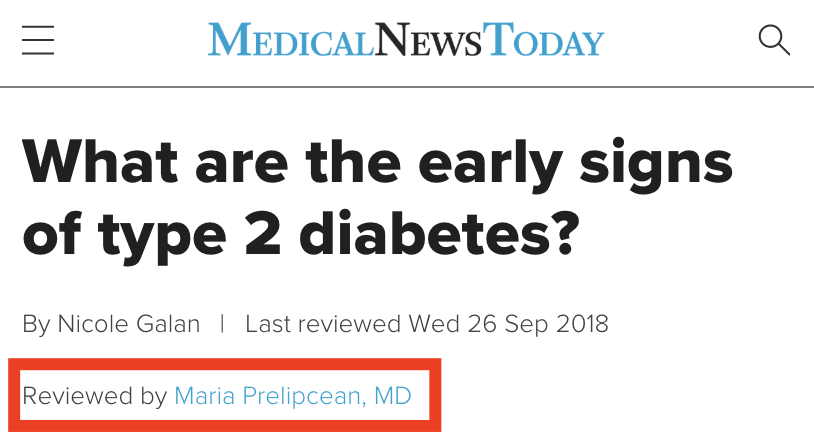
Many of their highest ranking articles are actually written by non-experts. But they are reviewed by experts with medical credentials.
Bottom Line: It is very important for certain types of topics to have the content written or reviewed by experts with relevant credentials. This is particularly true for health websites.
8. Cite authoritative references
If you are writing about scientific topics, then you should definitely cite references.
This is particularly important when it comes to health content.
If you show that your claims are backed up with links to scientific studies, then people will see that as highly trustworthy.
However, you need to make absolutely sure that the studies truly back up what you are saying.
It is best to link to studies directly from the text, in parentheses like (1, 2, 3). But some sites also get away with just showing a list of references at the end of the content.
You definitely should not “cherry-pick” your references to make a case for something that isn’t well supported by the majority of the evidence.
Cherry-picking and selectively linking to studies is very common on many natural health and nutrition sites.
If you want to be seen as trustworthy, then you need to present both sides of the argument.
This brings us to the next point, which has to do with scientific consensus.
Bottom Line: It is very important to cite scientific references if you are writing about health, medical or nutrition content. But don’t selectively pick references to try to prove something that isn’t well supported.
9. Don’t go against the scientific consensus too much
When it comes to information on scientific topics, Google wants to emphasize content that represents the scientific consensus.
Here’s a direct quote from Google’s Quality Rater Guidelines, part 3.2:
“High E-A-T information pages on scientific topics should be produced by people or organizations with appropriate scientific expertise and represent well-established scientific consensus on issues where such consensus exists.”
This means that you can get in trouble if you are making claims that are not well supported by mainstream science.
Because of this, many natural health websites have gotten in big trouble in the past year or so. Many of them are high-quality sites, but they have lost 90% or more of their traffic.
A large part of the reason likely is that the very nature of their websites is about going against the scientific consensus.
If your main topics are about less conventional health stuff, then it definitely helps to cite references to support your claims. But you should also present the other side of the story.
For example, you could say that some studies support what you are saying, but others don’t. Then you can mention that the mainstream medical community doesn’t agree with you and you can explain why you think they may be mistaken.
Try to establish yourself as an objective source on the topic instead of just trying to convince people that your opinion is true.
I personally think there are many cases where the scientific consensus is wrong, but this is the direction that Google is going towards. If you want to get search traffic, then you must adapt.
Whatever you do, always present both sides of the story if you are writing about something controversial.
This is what most Google searchers want to see. They want the actual truth, not just someone’s opinion.
Bottom Line: When it comes to scientific topics, Google wants to show content that represents the scientific consensus. If that doesn’t make sense for your content, at least try to present both sides of the story.
10. Manage your online reputation
Google asks its quality raters to examine the reputation of both websites and individual content creators.
This indicates that elements of Google’s algorithm can probably determine if a website or its authors have a good or bad online reputation.
If a lot of people are talking about you online and claiming that you aren’t trustworthy, then that is probably going to cause ranking problems.
Google doesn’t give out much information about how they do this, but it makes sense to look at sites like The Better Business Bureau, Trustpilot, and others.
Also, try searching for the name of your website and your site’s top authors on Google. What comes up on the first few pages?
I’ve also found Reddit to be an interesting place to research website and author reputation. Just type “name site:reddit.com” into Google (without the quotes).
For example, one website I was researching recently had been suffering from serious ranking problems. In less than a year, they had lost the majority of their search traffic.
Although the website had a good reputation, I found plenty of people online claiming that they got scammed after doing business with a previous website owned by the CEO. He also happened to be the site’s main author.
Many of the people mentioned his name explicitly in their comments in a way that would be easy for Google to understand.
I think this may have contributed to the site’s ranking problems because it was otherwise a highly authoritative website in its space.
If you are selling products and services, then poor customer service can definitely get you in trouble with online reputation.
That being said, if you already have a poor reputation, then you can take some steps to clean up your online profile.
For example, you can answer some of the negative reviews and explain your side of the story. Then try to prevent any future customers from having the same negative experience.
You can also ask your genuinely happy customers to place reviews of your business or site online.
Whatever you do, always try to do right by your readers and customers. If you don’t, then they are highly likely to talk about it online and it may affect your Google rankings.
Bottom Line: Having a good reputation is important for E-A-T. You should take steps to manage your brand’s online reputation and try to prevent readers and customers from having negative experiences in the future.
E-A-T is incredibly important for some topics
Google wants to show sites that have high expertise, authoritativeness, and trustworthiness (E-A-T), especially for certain topics.
If your site is about health or finance, or it can somehow affect people’s happiness or safety, then you need to pay serious attention to E-A-T.
The list above provides a lot of actionable ways to quickly improve your E-A-T, but this should also be considered as a long-term project.
Becoming an authority and building a good reputation are things that take a long time to earn. They aren’t built overnight.
All that being said, E-A-T is just one of the many quality factors that Google’s guidelines talk about.
If you have been hit by an algorithm update and have lost some of your search traffic, then there are many things besides E-A-T to consider.
For a more general article on getting your search traffic back, here are 10 ways to recover from a Google algorithm update.